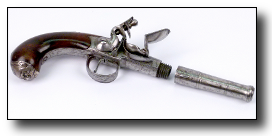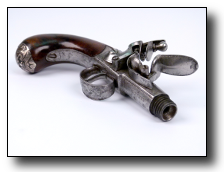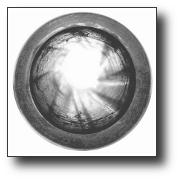|
Early Breech Loading Weapons
A muzzleloader`s propulsive charge
and projectile are loaded from the
muzzle or front of the barrel. A
breech loading weapon`s are loaded
from the rear. Breech loading weapons
were uncommon until the mid 19th
century, although they had been in
existence for many years. In the
early 16th century Leonardo Da Vinci
published an illustration that showed
a breech loading matchlock musket
with a turn-off barrel, meaning a
barrel that unscrewed.
|
|
Queen Anne Style
Weapons
A style of turn-off barrel
pistol became popular in
England during the reign of
Queen Anne (1702-1714). These
usually had a barrel that
resembled a cannon, silver
decorations, walnut stocks, and
silver butt-caps that featured
a grotesque mask. Pistols of
this style became known as
"Queen Anne" pistols.
|

|

|
The term is often broadly applied to English turn-off barrel weapons based on the style. These were made during most of the 18th century. Unscrewing (turning off) the barrel reveals a chamber that is easily filled with a precise amount of gunpowder. A lead ball fits in a cup on top of the powder. When screwed back on the ball fits tightly in the barrel making the wadding used in a muzzleloader unnecessary. When fired the increased pressure made possible by the tight fit added to both range and accuracy.
|
|
|
Rifled Barrels
Though most Queen Anne barrels have a smoothbore, some are rifled. The turn-off design made a rifled barrel more practical. The term rifle does not refer to the length of the barrel. Cannons, pistols and long guns can all have rifled barrels. Rifling is the process of making grooves in a barrel around its long axis. These grooves impart a spin to the projectile making its flight more stable and greatly improving accuracy.
|

|
|
|
Gentleman`s Pocket Pistol
Most Queen Anne Pistols are much smaller and lighter than Holster Pistols, which were designed to be carried in saddle holsters. Their size and weight made them easy to carry in the belt or the pocket and they were often referred to as a Gentleman`s Pocket Pistol. They were primarily intended for personal defense while walking or traveling by coach.
|
|
|
|